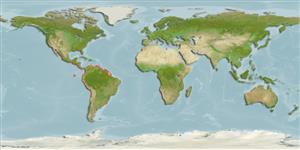Bivalvia |
Mytilida |
Mytilidae | Mytilinae
Environment: milieu / climate zone / djupintervall / distribution range
Ekologi
; brackvatten. Tropical; 6°C - 30°C (Ref. 104793); 29°N - 41°S, 116°W - 46°W (Ref. 83435)
Eastern Pacific and Western Atlantic. Introduced in the southeast USA and Philippines.
Length at first maturity / Size / Weight / Age
Könsmognad: Lm 1.3 range ? - ? cm Max length : 5.0 cm DL hane/ej könsbestämd; (Ref. 83435); 4.87 cm SHL (female)
Female max length from Ref. 104793. Typically found in lagoons (Ref. 101609) and mudflats (Ref. 104224). Tightly attached to a variety of naturally submerged and intertidal substrates such as oyster shells, water intake pipes, wood pilings, driftwood (Ref. 101609), floating docks, and boat hulls (Ref. 104224). Suspension feeder (Ref. 101609). In general, suspension feeding bivalves mainly depend on phytoplankton and detritus material for nutrition (Ref. 107088).
Life cycle: Embryos develop into free-swimming trocophore larvae, succeeded by the bivalve veliger, resembling a miniature clam (Ref. 833). Sex reversal was observed under certain food conditions (Ref. 104793).
Rosenberg, G. 2009 Malacolog 4.1.1: A Database of Western Atlantic Marine Mollusca. [WWW database (version 4.1.1)] URL http://www.malacolog.org/. (Ref. 83435)
IUCN Red List Status
(Ref. 130435: Version 2025-1)
CITES status (Ref. 108899)
Not Evaluated
Not Evaluated
Threat to humans
Human uses
Fiskeri: kommersiell
| FishSource |
Verktyg
Ytterligare information
PhysiologySyreförbrukning
Human RelatedStamps, coins, misc.
Internet-källor
Estimates based on models
Fishing Vulnerability
Low vulnerability (10 of 100).
Price category
Unknown.
